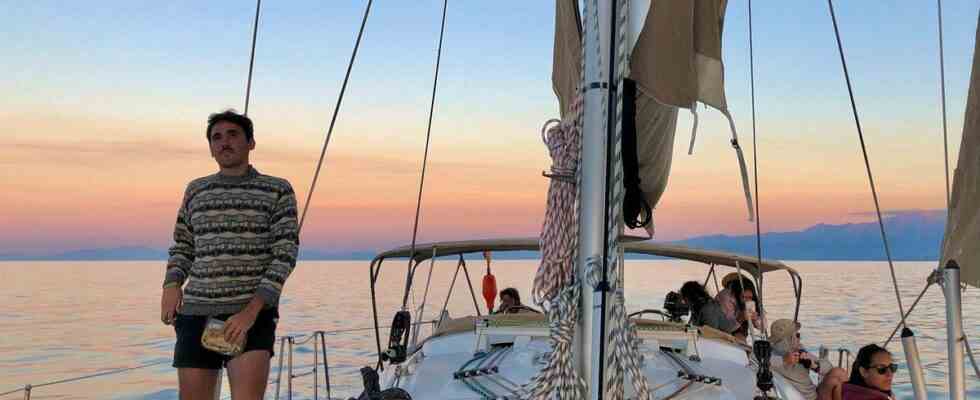“A very positive assessment,” says Marianne, one of the two skippers of the Nice adventurethe 15-meter sailboat aboard which sailcoop transports passengers between Corsica and the mainland. “We’re pretty full. On these bases, the project is viable,” she continues. Launched last May, this service has obviously met its public for crossings billed at 180 euros per person, meal included.
“I decided to stop flying and I learned about the carbon emissions of the ferries”, says Charlie, one of the seven passengers on the Calvi-Toulon trip on October 7-8, who traveled to Corsica to take part in a mathematics seminar on flood risks. “My laboratory accepted this travel option without difficulty”, specifies the young PhD student.
On October 7, the 50-foot monohull left the port of Calvi at 3:30 p.m. A light breeze of around 6-7 knots (around 10 km/h) is blowing south-southwest, is noted in the logbook, a document that all sailors are required to keep up to date when going out to sea. Once out of the port, the two skippers, Marianne and Rémy hoist the mainsail and unfurl the genoa (sail located at the front). the Nice adventure speeds along at 4.5 knots (about 7 km/h) while the citadel of Calvi slowly moves away in its wake, and as the sun fades behind it.
A peak at 13 km / h
On board, the passengers are rather young. Two doctor friends of just 30 years old boarded for their return from vacation, as well as a couple from the Var and a Belgian, the oldest of the crew that day. None of them have any real sailing experience and all seem surprised to see “how the coast remains visible for a long time”, remarks Emilie. The peaks of the Corsican mountains and the increasingly dim lights of the town of Calvi remained visible until late in the evening.
Shortly after the start, the wind decided to stop blowing and the skippers therefore decided to start the engine. A residual swell from a gale that had occurred the previous day in the Gulf of Genoa struck the boat abeam and caused it to roll unpleasantly. Two passengers experience a very slight seasickness, while plates of lentils and rice come out on deck after a pot of tapenade as a starter.
dolphins for coffee
The skippers then take their three-hour shifts each, and all watch for a while and take advantage of an almost full moon illuminating the sea which has gradually become calm again. In the early morning, after a night under motor, day breaks and a light breeze gradually dissipates the fog. “I thought that the feeling of no longer seeing the earth would be quite scary, but in fact no, not at all, it soothes”, comments Leïla, one of the young doctors on board.
A few dolphins pass in the distance and leave the passengers speechless, the coffee is heating it, the boat is sailing again as the islands of Port-Cros and the Levant begin to take shape on the horizon, in front of which warning clouds are forming. rain. “It’s our worst crossing,” concludes Marianne. “We had little wind, and now the rain…” A conclusion that does not seem to disappoint passengers, who are rather happy to know, in just 24 hours, a good sample of what navigation can hold . “I would still have liked to experience a good breeze”, regrets Patrice, the Belgian on board with us.
Overalls and raincoats are made available as the pouring rain begins to fall in the middle of the morning. It comes with a wind that allows us to reach our top speed for the crossing, 7.05 knots! (i.e. 13km/h) while the port of Toulon is still about fifty kilometers away. the Nice adventure returned to port with the sun returning shortly after 4 p.m. Passengers disembark, then just have to reach the station to take a train and travel the 60 kilometers that separate Toulon from Marseille, in just under an hour. “And you, your train, what time is it? “, we wonder between passengers. It taps on the laptops to check the schedules. Charlie has one leaving for Paris in 15 minutes. “I’m going to hurry up and give it a shot. » A quick goodbye, the time to wish « fair winds » to the two skippers, marks the return to life on land.

